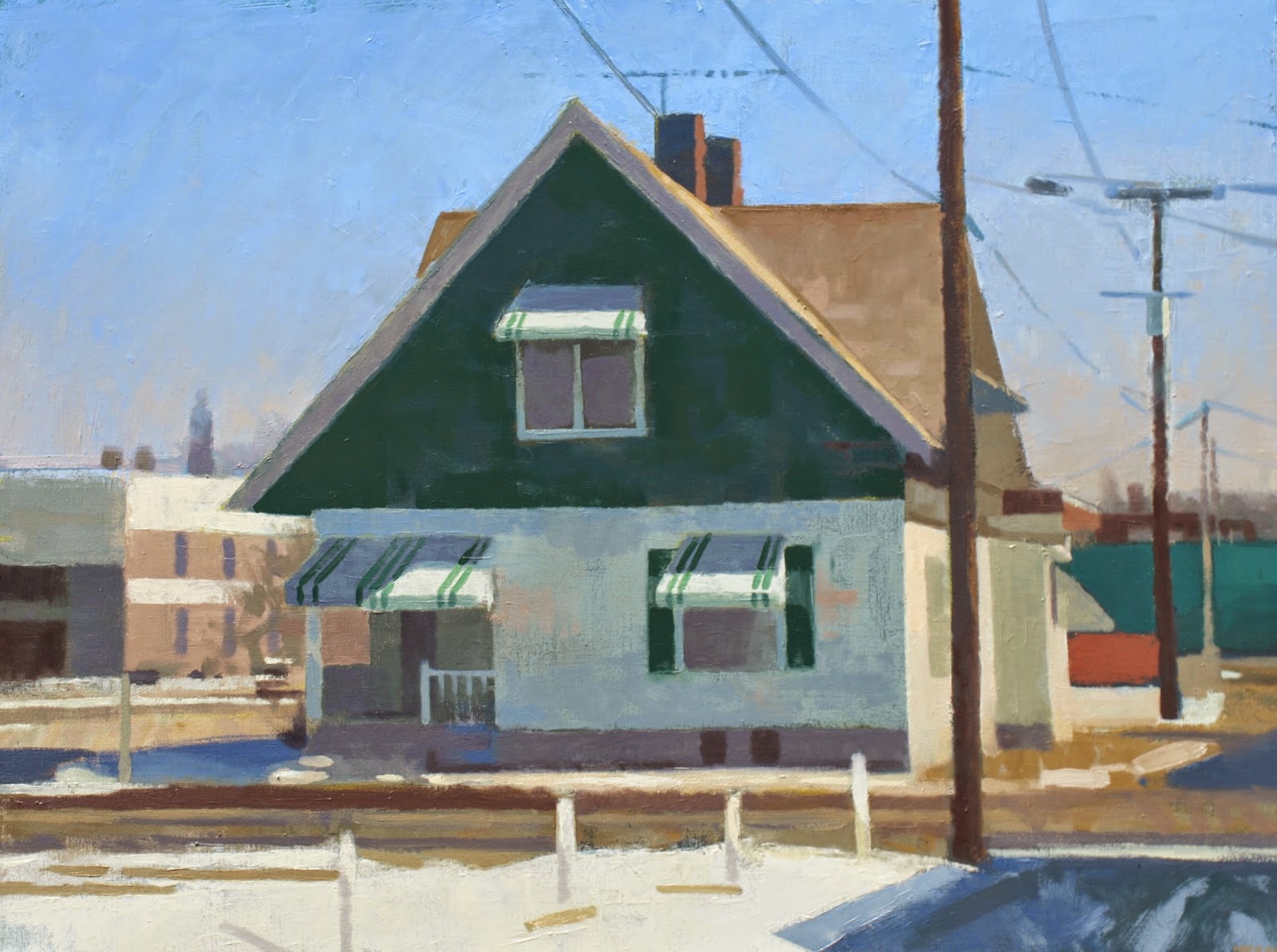Enlarging the World
Winter Street, oil on canvas, 24" x 30"
Through my front window from where I am sitting I can see three young girls, about 10 years of age, playing on the sidewalks of our cul-de-sac street. Each girl rides her own small, low-slung scooter, standing astride the running board with one leg and kicking off with the other. One of them is the obvious leader. She calls out the rules of a game that she is improvising moment by moment. The others give chase wherever she leads them.
My own childhood was largely spent in such a way. I grew up on a city street not unlike this one, full of similar houses and families, yet in my memory every square foot of that world was enchanted, a blank canvas onto which I could project any fantasy. When I visit home I always take a turn down my old street, lured by memories and some faint hunger to experience again that magic, but I'm always surprised at how ordinary it all seems now. Yes, the trees are younger, the cars are newer, and the curbs are lower from all the repaving over the past 40 years. Curiously, it's the spaces between things that I most notice. They seem to have shrunken. The vastness of my childhood landscapes has vanished. Everything else, the houses and yards, are exactly as they were when my friends and I roamed this idyllic domain. The only difference I can account for is the fact that I'm no longer 10. I've lived myself into a new, and strangely smaller world.
White House, Autumn (Waterville, Maine),
oil on panel, 15 x 12 inches
These musings on the variability of perceptions of space remind me of one of C.S. Lewis' stories, The Great Divorce, in which a group of inhabitants from Hell are granted a field trip to Heaven. Lewis describes Hell as a sprawling gray city, seemingly without limit. As they journey from the lower to the upper reaches, the Hellions realize that the place they have left is not vast at all. In fact, in comparison with Heaven, it is microscopic, a place of ultimate constriction and limitation. It seems to me that as we journey to adulthood a lot of us make that bus trip in reverse. We leave the expansiveness and limitless potential of imagination for the constrictions of responsibility and the abstract awareness of "reality." The coin of that realm is reduction - experience boiled down to manageable notions about things like time, duty, or love and death. Concepts are useful but they are tidy, compact things compared with actual, sensuous experience. When you look into any small piece of the world as we do in painting, everything unpacks like one of those portable plastic panchos that you can never get back into its package.
In the same way that a small patch of ground can become the whole universe to a child with an imagination, the slow, meditative practices of art have a way of enlarging the world. With brushes or knife in hand, painters don't just have an inner child, they are their inner child, a strange hybrid of adult knowledge and experience curiously stalled on the threshold of the magical doorways to childhood imagination. I may no longer see German soldiers or nefarious wizards lurking in the shadows as I did when I was 10. When I regard the physical world around me now I see paintings. More importantly, I see myself making those paintings, enjoying a foretaste of the pleasures of mixing paint and moving the brush through those colorful spaces even before I get out my easel. Ultimately the decision to act on this reverie and to actually start a painting comes down to a question that any child would understand: will it be fun?
Like the discarded cardboard box that becomes a castle, or the perfectly shaped stick that imagination morphs into a WWII Thompson machine gun, ordinary things are best. One of the greatest pleasures of making art is feeling one's power to transform simple materials and subjects into something meaningful and beautiful. Cezanne said, "With an apple I will astonish Paris!" For me, I like to start with where I live. It all begins with a kind of bus trip of the mind, setting off from the constricted, compartmentalized spaces of the adult mind to rediscover vast landscapes of enchantment and delight.
The Fan, Richmond, Virginia,
oil on panel, 8 x 6 inches.
Back Alley, The Fan, Richmond, Virginia,
oil on canvas, 14 x 11 inches





Comments
Post a Comment